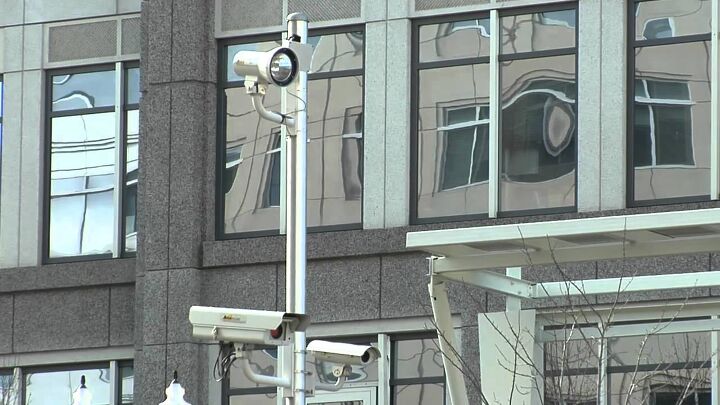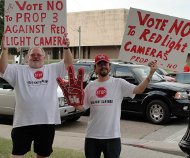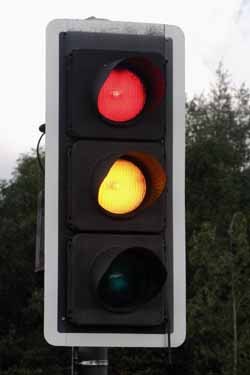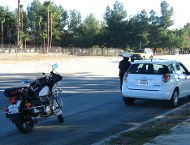#Traffic
California Court Softens Ban on Testimony Questioning Breathalyzer Accuracy
Since 1994, the California courts have banned defendants from using scientific evidence to challenge certain charges for driving under the influence of alcohol (DUI). To foil defense attorneys who had become increasingly successful with juries, the state created a “per se” DUI charge that made it a crime to have 0.08 reading on a breathalyzer machine regardless of whether an individual was actually drunk or had a 0.08 percent blood alcohol content (BAC) level. Because of physiological variability among individuals, some people with the same blood alcohol level might read higher or lower on the breath machine. Challenges based on these differences are known as “partition ratio” arguments. The California Court of Appeal on Friday loosened what had become effectively a ban on scientific criticism of breathalyzer reliability.
Spain: Speed Camera Gives Ticket for Driving Too Slow
Drivers who pass a photo radar location frequently drop their speed far below the legal limit to be absolutely certain no citation will come in the mail weeks later. In response, officials in Valencia, Spain have begun issuing photo tickets to drivers who are moving “too slow.” Motorist Jesus Llorens received just such ticket in the mail on June 14 for sluggish driving past a camera in an Opel Vectra. The alleged offense happened in February at 11am in the tunnel of the Avenida del Cid.
IIHS Red Light Camera Study "Not Credible"
[Editor’s note: My take on the IIHS study’s shortcomings can be found here]
The public relations arm of the insurance industry yesterday released a report claiming red light cameras are popular in big cities. About 24 hours after Insurance Institute for Highway Safety (IIHS) had begun spinning this study to media outlets, only a handful had run stories. Editors at one daily publication told TheNewspaper that they passed on writing about a claim they did not find credible.
Washington: Anti-Camera Group to Shame City Council
Opponents of automated ticketing machines in Monroe, Washington have turned to a new tactic in battling a city council that refuses to give up the use of red light cameras and speed cameras. Instead of engaging the city and a wealthy traffic camera company in a costly legal battle, the group BanCams.com decided Wednesday to shame the council at every election until officials follow the public will.
Europe: Silly Americans, Cities Are For Pedestrians
From its very first paragraph, a recent New York Times article trolls hard for defenders of America’s car-centric culture:
While American cities are synchronizing green lights to improve traffic flow and offering apps to help drivers find parking, many European cities are doing the opposite: creating environments openly hostile to cars. The methods vary, but the mission is clear — to make car use expensive and just plain miserable enough to tilt drivers toward more environmentally friendly modes of transportation.
Does that not have your red American blood boiling? Stand by for some technocratic condescension from a Euro-crat
“In the United States, there has been much more of a tendency to adapt cities to accommodate driving,” said Peder Jensen, head of the Energy and Transport Group at the European Environment Agency. “Here there has been more movement to make cities more livable for people, to get cities relatively free of cars.”
Though the piece continues generally in this vein, the NYT has blessedly decided that there is “Room For Debate” on this issue, and has posted a number of diverging perspectives on it. Urban planning is a notoriously heated topic, accentuating the urban-rural divide as well as the central-planning-versus-absolute-freedom ideological divide, both of which are more pronounced in the US than in Europe. With this in mind, let’s make sure we approach this topic in a respectful, constructive manner. It’s a topic that will inevitably come up again in the future, so let’s take this opportunity to practice discussing it without resorting to ideological name-calling. [HT: David Holzman]
Decision Overturning Houston Anti-Camera Referendum Appealed
The battle over the Houston, Texas red light camera program returned to the legal spotlight Monday. A majority of voters agreed with Francis M. Kubosh and Randall Kubosh in November that the automated ticketing machines should be removed, but a federal judge intervened earlier this month and overturned the election ( view ruling). The Kuboshes filed a reply brief with the US Court of Appeals for the Fifth Circuit Monday seeking to restore the result of the public vote.
UK Government Ends Speed Camera Secrecy
The UK government on Sunday officially terminated the policy of concealing safety and revenue information for individual speed camera locations. The Labour government had held this information secret, but Road Safety Minister Mike Penning, a member of the Conservative Party, insisted on making it readily available to the public online.
“We want to improve accountability and make sure that the public are able to make informed judgments about the decisions made on their behalf,” Penning said in a statement. “So if taxpayers’ money is being spent on speed cameras then it is right that information about their effectiveness is available to the public.”
Louisiana Supreme Court Allows Vehicle Searches on a Hunch
The Louisiana Supreme Court on Friday gave a green light to police officers looking to search automobiles without a warrant. The court ruled on an interim appeal in the ongoing trial of Derrick R. Kirton, 30, and Crystal N. Strate, 27, who were charged on February 23 with distribution and possession of heroin, respectively. A judge in the Orleans Parish Criminal District Court had ruled that the police search of Kirton’s vehicle was unlawful because it was not based on probable cause. The prosecution appealed.
Traffic Camera Companies Step Up Fight Against Ballot Measures
Although red light camera supporters insist the programs enjoy broad support among the public, traffic camera companies are taking extraordinary measures to block ballot measures that would gauge public sentiment on the issue. Anti-photo enforcement initiatives are meeting corporate opposition in five cities in Washington state while American Traffic Solutions (ATS) is moving to reinstate red light camera use rejected by a majority of Houston, Texas residents. Albuquerque, New Mexico appears to be the only city with an unopposed referendum vote in play.
AB 529: California's Red Light Revenue Raid
Not satisfied with impoverishing residents and unwary visitors with $500 automated tickets for being a tenth of a second late at a light, California’s legislators are moving a new bill allowing cities to reduce many posted speed limits by 5 mph. The lower limits will, in turn, allow them to shorten yellow lights, which will produce more red light camera tickets (four of the sponsoring cities have red light cameras).
Are You Ready For: Cars That Get Inside Your Head?
Google’s autonomous cars have already shown how close vehicles are to driving themselves in day-to-day traffic, but there’s still one uncontrollable, unpredictable, and often-irrational variable that autonomous cars still struggle to cope with: you, me and all the other haphazardly-programmed human beings on the road. And though predicting human behavior might be one of the most difficult tasks for a human-programmed computer, researchers at MIT are already digging into the challenge. Using model cars (one autonomous, one human-controlled) on overlapping tracks, 97 out of 100 laps avoided collision. But not all of those laps fell into the near-collision “capture set”… which, as it turns out, is what makes the human threat to autonomous cars so challenging.
According to [MIT Mechanical Engineering Professor Domitilla] Del Vecchio, a common challenge for ITS developers is designing a system that is safe without being overly conservative. It’s tempting to treat every vehicle on the road as an “agent that’s playing against you,” she says, and construct hypersensitive systems that consistently react to worst-case scenarios. But with this approach, Del Vecchio says, “you get a system that gives you warnings even when you don’t feel them as necessary. Then you would say, ‘Oh, this warning system doesn’t work,’ and you would neglect it all the time.”
Florida City Agrees to Refund Illegal Red Light Camera Tickets
Some Florida are beginning to regret jumping on the red light camera bandwagon without bothering to wait for state legislative approval. On Wednesday, the Pembroke Pines city commission voted to approve a settlement with attorney Jason D. Weisser who filed a lawsuit against a number of towns that began automated ticketing before state law was changed last July to allow automated ticketing.
New Jersey Supreme Court Criminalizes Weak Breathalyzer Blows
Blowing into a breathalyzer weakly is grounds to convict someone of the crime of refusal, according to a May 26 decision by the New Jersey Supreme Court. Refusal carries penalties nearly as severe as a conviction for driving under the influence of alcohol (DUI). On November 29, 2007 at 2:36am, Sergeant Joe Morgan of the Woolwich Township police department pulled over Aaron P. Schmidt after noticing that he was driving 10 MPH under the speed limit. Morgan administered the usual field sobriety tests and decided to bring Schmidt to headquarters for a breath test.
Canada: Anti-Photo Enforcement Effort Heats Up
A campaign to reform or eliminate the use of red light cameras and speed cameras is heading up in Winnipeg, Canada. Earlier this month the group WiseUpWinnipeg kicked off the effort with a two-page, full-color advertisement in the Winnipeg Sun newspaper.
“Attention Winnipeg drivers, you are being deliberately deceived,” the ad warned. “The city of Winnipeg is engaged in a deliberate and dangerous campaign to induce photo enforcement violations and siphon your hard earned (cash).”
California Considers Bill to Shorten Yellow Times
The amount of yellow warning time at California intersections would drop along with speed limits under a bill being considered by the state legislature. The Senate Transportation Committee will hold a hearing Tuesday on Assembly Bill 529, a proposal that re-writes the state’s speed trap law so that cities would be able to round down all speed limits after conducting a traffic study. The measure passed the full Assembly by a 77 to 0 vote on May 19.




























Recent Comments